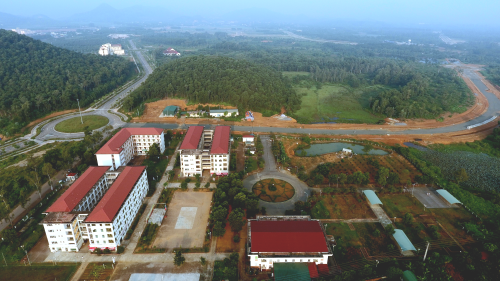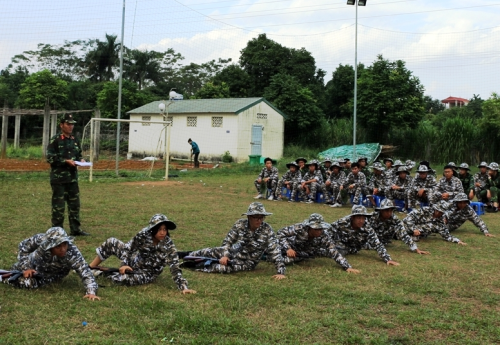Defence and Security Education Centre under Vietnam National University, Hanoi improves its task performance
The Defence and Security Education Centre under the Vietnam National University, Hanoi has been taking measures synchronously to realize the policy on education renewal and achieved the encouraging results, thereby greatly enhancing the quality of defence and security education provided for students.
 |
| Panorama of the Defence and Security Education Centre under the Vietnam National University, Hanoi |
The Defence and Security Education Centre under the Vietnam National University, Hanoi is tasked with providing defence and security education for students from the Vietnam National University, Hanoi and 10 other universities, vocational colleges and schools under the Joint Circular 123/2015/TTLT-BQP-BGDĐT-BLĐTBXH, dated November 5th 2015 by Ministries of National Defence, Education and Training, and Labour - War Invalids and Social Affairs. It is also tasked with advising the University’s Party Committee and Board of Directors on leading, directing and well performing the military-defence work. In recent years, it has also provided defence and security education for high school students in the area of Hanoi city via the model of “defence and security education week” and the reality activity of “Military skills”. In the process, a part from advantages, it has faced a lot of difficulties; its personnel and facilities have yet to meet the increasingly higher requirements for defence and security education. Fully aware of that, over the past years, the Centre’s staff members have always strived to build a strong Centre comprehensively and make it a reliable destination of defence and security education for students in the capital city. With its achievements, the Centre was given the Third-Class Labour Medal by the State President and many certificates of merit by the Government, the Ministry of National Defence (MND), the Ministry of Education and Training (MoET), and the Vietnam National University, Hanoi.
To meet the requirements for the fundamental and comprehensive reform in education and training under the Resolution 29-NQ/TW by the 11th Party Central Committee and to keep pace with the development of the 4th industrial revolution, the Centre has determined to ceaselessly improve its task performance, striving to satisfy the accreditation of the quality of output defence and security education for students. To that end, the Centre has focused on the main solutions as follows.
First, to enhance its cadres and instructors’ capability and professional competence. This is an urgent requirement, a solution, and a deciding factor for renewing and improving the quality of defence and security education provided for students. To do so, the Centre has accelerated the personnel planning, diversified forms of training to improve its cadres and instructors’ capacity comprehensively, selected and dispatched young cadres and instructors with good morality and capacity, and high responsibility to attend postgraduate and refresher courses. At the same time, it has closely cooperated with faculties and colleges under the Vietnam National University, Hanoi in holding refresher courses on teaching method, information technology, and foreign languages in a bid to build a contingent of cadres and instructors with standard educational level and creativity. Yearly, while sending cadres and instructors to attend refresher courses held by the Defence and Security Education Department (the MoET) and the Infantry Officer College No.1, the Centre organizes many on-spot training courses, particularly improving the quality of teaching method via activities, such as lecture visit, lecture criticism, teaching contest, assigning good, experienced cadres and instructors to train young ones, maintaining the order for good instructors and managerial cadres contests. Notably, it has encouraged and created a favourable condition for cadres and instructors to undertake researches. Focuses of research and study have been placed on applying the achievements of the 4th industrial revolution, such as information technology, digital technology, and automation control technology to teaching activities; on using the Internet to search for and exploit sources of information related to defence and security as well as the hyperlinks to design high-quality lectures, provide updated knowledge, boost the interaction, and draw attention of learners, thereby improving the teaching quality. With those approaches, up to now, over 80% of its cadres and instructors have held postgraduate degrees. In the 2014-2015 school year, the Centre won the first delegation prize, one individual second prize and one individual third prize in the Good Defence and Security Education Instructor Contest held by the MoET.
 |
| Infantry tactics training |
Second, to actively review, adjust and supplement the training content and program in accordance with each group of learners. Grounded on the framework for defence and security education, the Centre has removed the coincided contents in the university-level outline study program, clearly distinguished between political contents and military contents, reduced the duration for theoretical study and increased the duration for practice. The Centre has identified the main points of each topic and made it relevant to the major of each group of students. It has also directed its faculties and instructors to regularly include new issues on defence, security and Homeland protection tasks in their lecture, ensuring that defence and security education always meets the development of the situation. Over the past years, the Centre has adjusted the defence and security education program intended for high school students in accordance with their study duration and intellectual level. Focuses of the program have been put on introducing the Party and State’s basic guidelines and viewpoints on defence and security and the all-people national defence; on improving their sense of discipline and equipping them with needed, proper military skills.
Third, to accelerate reform in teaching and learning method and combine study with discipline maintenance. The Centre has seen it as a breakthrough measure to enhance the quality of providing defence and security education for students. To do so, it has required cadres and instructors to apply information technology and modern equipment to teaching process, make electronic lesson plans, employ projectors and images and videos simulating combat situations and skills in order to circulate new information about military, defence, security operations to learners and attract their attention. During class, instructors have promoted their functions as both teachers and trainers, flexibly employed various methods of operation and instruction, and particularly increased group tasks so as to encourage debate and discussion, thereby stimulating learners’ proactiveness and creativity and making them more thoroughly understand the lesson. Besides, the Centre has applied multiple-choice examinations and stepped up the work of inspecting and investigating teaching and learning on an objective, equal, accurate basis. It has now built tens of sets of multiple-choice exam questions relevant to the training content and program.
In addition to equipping learners with theoretical knowledge, the Centre has attached great value to the work of student management and training in order to form students’ military style. At the same time, it has asked its cadres and instructors to closely combine knowledge transmission with revolutionary ideal transmission and the building of students’ political will and military skills; to heighten role model-setting responsibility and build a healthy military pedagogic and cultural environment. The Centre has developed and issued the regulations on student management and training and introduced them to students at the onset of each course. During their course, students are divided into companies and platoons and have a chance to experience the military environment with military daily, weekly order and regulations. Moreover, the Centre have actively organized extracurricular activities, such as news talks, film watching, military science information, visits to museums, military units, and cultural-artistic programs, thereby creating a democratic, friendly environment, arousing students’ activeness and self-awareness during their course.
Fourth, to invest in modernizing facilities and teaching-learning equipment. Over the past years, in addition to the budget allocated by higher echelons, the Centre has actively given recommendations to the University’s Party Committee and Board of Directors to invest in its facilities, teaching equipment, military uniform, accommodations, textbooks under the regulations, while proactively asking military units to help with training grounds. In 2018, the Centre was given nearly 90 bn VND by higher echelons to build school auditorium with modern, standard specialized classrooms. In the upcoming time, the Centre will continue to cooperate with competent offices in ensuring the budget for building the system of integrated data lines, smart connection, virtual shooting ranges, and electronic libraries as well as upgrading the system of specialized classrooms and equipment in order to facilitate the research, teaching and learning tasks of cadres, instructors and students. Moreover, the Centre has renewed and enhanced the effectiveness of higher education management, with a focus on formulating the procedures for receiving and managing students and the process of management, operation, task performance evaluation of cadres and instructors in a professional, modern way.
Adopting those above-mentioned solutions will provide an important basis for the Defence and Security Education Centre under the Vietnam National University, Hanoi to continue robustly developing, improving the quality of providing defence and security education for students, greatly contributing to raising their awareness and responsibility towards the Homeland construction and protection.
Dr Tran Danh Luc, Secretary of the Centre’s Party Committee, Commandant of the Centre